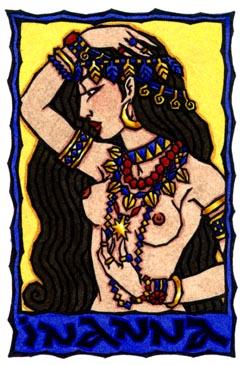It is a point often made by Pagans that what smart atheists, à la Daniel Dennett or Christopher Hitchens, reject is a version of religion and cosmology that many Pagans also reject. And not only Pagans are making the point.
The unreflective religiosity that still holds sway in much of the world today, which posits a father figure in the sky who listens and gets angry and forgives and judges just as we do -- not allegorically, but in some way literally -- is one which requires not merely a suspension of disbelief but a suspension of the act of reason itself. As many of today's "new atheists" have pointed out, this belief is intrinsically both unverifiable and irrefutable, and thus consonant only with faith in its most fideistic form.
Jason Pitzl-Waters links to this smart, provocative article by Jay Michaelson, on nondual Judaism, in which Michaelson explores the felicitous pairing of nonduality (the belief that the divine, the world, and humanity aren't separate) and polytheism (the belief that the gods are many). Why do spiritual traditions that embrace one often embrace the other, when the two appear contradictory?
We have at our disposal thousands of myths, symbols, and other linguistic technologies that enable us to speak obliquely of the unspeakable. And the more deeply we know ineffability, the more amenable we are to multiple forms of approximation. So nonduality and polytheism exist not in uneasy tension, but as complements of one another.
Micahelson also explains why, despite his own nondual and polytheistic leanings, it might still make sense for him to practice a form of Judaism. Here he takes a pragmatic and theologically humble approach to religious practice that greatly appeals to me.
As I return to my cherished symbols, to challah and wine, candles and songs, I do so with no pretension or desire that they are in any way superior to other symbols, or more accurate, or more holy. Yes, some symbols are better than others, relatively speaking; better candles than guns. But their worth is evaluated in a consequentialist way, in terms of the kinds of life on this world they engender. In terms of the absolute, they are all technologies, nothing more; they are fingers that gesture at the moon, and that also, if I may extend the metaphor, reflect the moonlight into hand and home. Could challah and kiddush be communion wafers and wine instead? Of course. Are they in fact descended from loaves baked for Astarte? Most likely. But it doesn't matter. This is an antifoundationalist religion, as Richard Rorty would describe it: one without claims of priority, but with an affirmation of utility. I take up these tools not because they are God-given or superior to others, but because these tools work, especially for someone who grew up with them. They work because they have been used for thousands of years, refined by tradition, and imbued with value and mystery I cannot understand. They also do not work, for many people, and though I might at times labor to justify and elaborate on them, ultimately that is deeply fine as well. I choose these tools because I love them, and nothing more. No theology, no history, and community only, for me, in a secondary role. I love them; that is enough.
(With thanks to Jason for his incomparable reporting on issues of interest to Pagans.)
Sunday, February 03, 2008
Subscribe to:
Post Comments (Atom)




1 comment:
That is one of the wisest and most open things I have read for a long time. Thank you for drawing attention to it.
Post a Comment